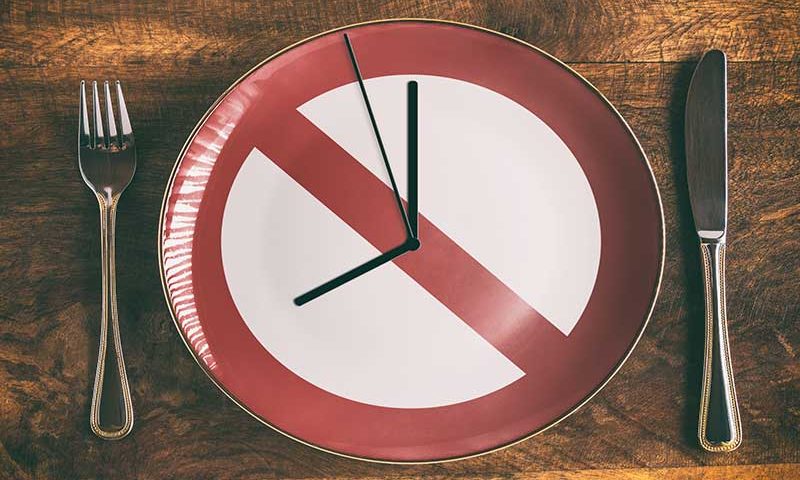
Yoga history and origin, benefits and the philosophy it teaches
12th May 2017
How yoga practice can help improve low self-esteem
1st June 2017Benefits of intermittent fasting, how does it work and how to start

Benefits of Intermittent Fasting | Ana Heart Blog
Intermittent fasting for weight loss and to burn those stubborn calories
Intermittent fasting is an eating pattern where you alternate between periods of eating and fasting. This system doesn’t advise you on which foods or type of foods to eat, but instead, the focus is purely on the time of when you should eat them.
No food is allowed while you are fasting, but you can still drink water, tea, coffee or any other calorie-free drinks.
Intermittent fasting has become popular over the last few years due to the rise in diets such as the 5:2 diet; which is essentially an extreme form of intermittent fasting, however, the eating periods and fasting periods that are more common among those who practice it regularly are more likely split over hours rather than days.
If you think about it, you actually already “fast” every day when you’re sleeping. A common way of intermittent fasting is simply lengthening the time you do this for. This is done by eating your first meal later in the day and your last meal by a certain time at night, to give you a good number of hours in between in which to fast.
A common timescale for this is to eat your last meal by 8 pm at night and then don’t eat the following day until 12 pm. This gives you a 16-hour window of fasting and is a really popular form of intermittent fasting known as the 16/8 method.
This method is pretty easy to do and stick to, because you’re probably already fasting for a long period of this time anyway, so although to begin with you may feel some hunger when your body is getting used to the extended time period, long term it’s easy to manage and generally those who fast in this way say they feel better and have more energy as a result.
How does intermittent fasting work?
Your body cycles through various states throughout the day as you eat. Your body is considered to be in a “fed state” when it is digesting and absorbing food and is considered to be in a “post-absorptive state” when it isn’t processing a meal.
The fed state begins when you start eating and can last for anything from three to five hours as your body processes, digests and absorbs the food that you ate. When you are in this state it is hard for your body to burn fat as you have high insulin levels.
The post–absorptive state is the state you are in when your body isn’t processing a meal. This state lasts until 8-12 hours after your last meal and after this time you enter the fasted state. When you are in the fasted state this is when it is easiest for your body to burn fat as our insulin levels are low and therefore your body will access the fat that it couldn’t during the fed state.
Entering the fasted state doesn’t happen until 12 hours after your last meal of the day so it’s very rare that you ever get to the fat burning stage, as even the time you are asleep isn’t long enough. As a result of these many people who begin intermittent fasting will begin to lose fat before they’ve even begun to change their diet or exercise regime.
Why practice intermittent fasting?
The concept of fasting to humans is not a new one and has been around for thousands of years. Sometimes it happened purely because there was no food available, so humans would fast out of necessity. Religions have also encouraged fasting for various reasons and therefore it’s something that many people are familiar with and practice a few times a year.
Our bodies are also more than capable of handling a period of fasting, so there is no need to worry about doing it, your body even instinctively goes into fasting mode when you are ill! By fasting, you change some of the processes in your body and this allows your body to continue to function properly during that time, meaning it is not harmful to do.
Studies suggest that some of the benefits of intermittent fasting include:
- Reduction in blood sugar and insulin
- Restricts calories and burns fat, so can help with weight loss
- Metabolic health benefits
- Protects against diseases including heart disease, diabetes, and cancer
How do I start intermittent fasting?
If you start with a method such as the 16/8 as mentioned above then it’s easy to get started. Simply ensure that the meals you eat all fall within a given time window such as from 12pm – 8pm. This means that you will not eat from 8pm – 12pm each day a period of 16 hours in which to fast.
Here are some tips for getting started:
- Make sure you’re ok to fast – if you’re pregnant or diabetic for example then this isn’t advisable. If you’re unsure always check with your doctor
- Remember to drink – when you’re fasting you can still drink no-calorie fluids, so don’t forget to keep well hydrated
- Fit it around your lifestyle – if you know that you eat later at weekends then maybe to begin with only do it Monday – Friday. You’re much more likely to stick at it if it fits around your everyday life.
- Be prepared – mentally and physically this will be a shift, so make sure you’ve done all the preparation you can to make it go smoothly
- Keep your meals in check – It might be tempting to have a blow out before you start fasting, or eat everything in sight as soon as 12pm comes, but you need to keep the rest of your food as it normally would be. Overindulging after a fast will cut out any positive effects that it had.
Although intermittent fasting is simply a process about the time that you eat if you want to really see the benefits we recommend sticking to healthy nutritious food choices and drinking plenty of water or tea to help nourish your body. As with all new diet/exercise routines, it is usually a good idea to seek the advice of a medical professional before you undertake a new routine. If you do decide to give it a try good luck!

